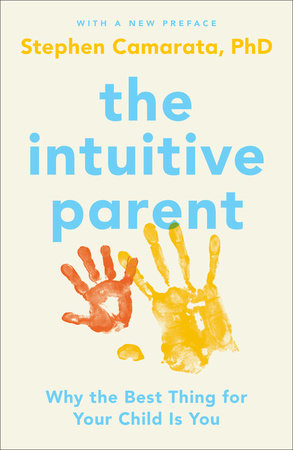Easy Activities That Help Babies Grow Up Smart
by Stephen Camarata, Ph.D.
Parenting a baby or toddler these days seems to happen at breakneck speed. Not only is the sheer work of caring for your baby an important responsibility, it has to be balanced with a busy work schedule, maintaining a happy and healthy home, and making time for the other personal relationships that make life so rewarding. To make matters worse, there is ongoing — and relentless — pressure to make sure you are doing everything you possibly can to help your baby grow and learn.
The normal and natural challenges associated with nurturing a baby are massively intensified by slick marketing ploys, peer pressure, and educational get-rich-quick-schemes that imply or even directly claim that their product or parenting approach will make your child smarter. Sometimes, this advice, product, or educational software is pushed using “the latest brain science” as somehow being superior to your own natural parenting. This can turn an amazing and rewarding parenting experience into a frantic, guilt-ridden quest to cram learning into your baby’s brain, stealing the joy and fun of parenting from both you and your baby.
What Really Makes Your Baby Smarter?
If you have twenty minutes to spend with your baby, which will make your baby smarter: reading books to them, talking to them and playing games, or plugging them into the latest “make-your-baby-smarter” DVD? It may surprise you to learn that scientific studies comparing these activities consistently show that reading, speaking, and playing is far superior to learning via DVDs. The insidious part of the story is that when parents were questioned about which activity made their child smarter, most believed that the DVDs were better, even though direct measures of the child’s ability proved otherwise!1
In truth, you are the very best teacher your baby could possibly have. The latest science indicates that “make-your-baby-smarter” software, games, and DVDs actually teach your child far less than natural parenting.2 Flashing letters on a computer screen seems more modern and scientific than cuddling together in a chair and reading a book the old-fashioned way. But seeing letters on a screen does not teach a toddler to understand the “real world” meaning of the words and phrases in a story. Worse, pounding letters into your baby’s brain using a computer does not support or strengthen the emotional bonds between parent and child or provide a positive learning experience the way reading together does.
Simple Is Powerful
Everyday activities that are a normal part of caring for your child are actually very powerful brain development episodes. Simple things like talking to your baby when you change them, playing simple games such as peekaboo and patty-cake, and, most importantly, sitting with your baby and telling simple stories, nursery rhymes, and reading books will do far more for your baby’s brain development than any slick app, computer program, or DVD. For example, scientific research has shown that when a mother smiles and talks to her newborn or very young infant, this activity lays the groundwork for language development while actually wiring her baby’s brain to perceive and process speech.3 In addition, smiling and responding to your baby when they vocalize (babble, coo, or squeal) sets the foundation for social skills and for healthy emotional development.4
Snuggling with your baby or toddler in a chair and rocking with them while you tell a simple story or read a colorful book will reinforce the child’s natural curiosity while also laying the groundwork for a lifelong love of reading and learning. In contrast, two-dimensional “brain development” apps, games, and DVDs simply cannot replace the emotional attachment or the rich perceptual experience of parent-child interaction.5
Follow Their Lead
Rather than free-range or laissez-faire parenting, which essentially turns childrearing over to the environment in an uncontrolled fashion, the key ingredient for intuitive parenting is paying attention to and responding to your developing child naturally and intuitively. Instead of forcing a child down a predetermined “brain development” checklist that treats every child as a lab animal or as an assembly line product, following your child’s interests will automatically ensure that the input that you are providing is what they — and their brain — need in that moment.
This in turn enhances thinking ability and problem-solving while also building real self-confidence and resilience. In short, putting away the flashcards and the baby genius DVDs to become your child’s learning partner, by talking, playing, and reading to them naturally and intuitively, will help to ensure that your baby will grow smarter, happier, and healthier from an emotional standpoint. You will also have a lot more fun along the way!
References
1. DeLoache, Judy S., Cynthia Chiong, Kathleen Sherman, Nadia Islam, Mieke Vanderborght, Georgene L. Troseth, Gabrielle A. Strouse, and Katherine O’Doherty. “Do babies learn from baby media?.” Psychological Science (2010).
2. Christakis, Dimitri A. “The effects of infant media usage: what do we know and what should we learn?.” Acta Paediatrica 98, no. 1 (2009): 8-16.
3. Fernald, Anne, and Patricia Kuhl. “Acoustic determinants of infant preference for motherese speech.” Infant behavior and development 10, no. 3 (1987): 279-293.
Werker, Janet F., H. Henny Yeung, and Katherine A. Yoshida. “How do infants become experts at native-speech perception?.” Current Directions in Psychological Science 21, no. 4 (2012): 221-226.
4. Hasson, Uri, Asif A. Ghazanfar, Bruno Galantucci, Simon Garrod, and Christian Keysers. “Brain-to-brain coupling: a mechanism for creating and sharing a social world.” Trends in cognitive sciences 16, no. 2 (2012): 114-121.
5. Csikszentmihalyi, Mihaly, and Kevin Rathunde. “The development of the person: An experiential perspective on the ontogenesis of psychological complexity.” In Applications of Flow in Human Development and Education, pp. 7-79. Springer Netherlands, 2014.

